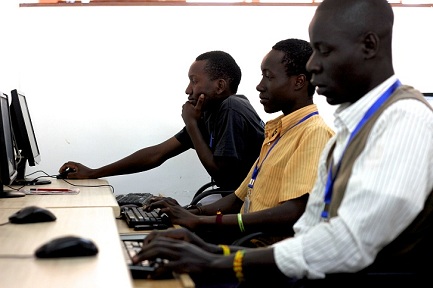Impact Sourcing: How combining work and study ends the cycle of poverty for good
When we launched Digital Divide Data (DDD) as a social enterprise in Cambodia in 2001, we quickly realized that providing work opportunities to disadvantaged high school graduates was not enough. While temporary work could give youth income and basic job skills, they and their families could remain stuck in the cycle of poverty once these short contracts ended.
DDD’s management team, including colleagues in our three offices, established metrics to assess our impact. These included the personal, socioeconomic and skills development of every employee. It became clear that a university degree, in addition to work experience, was the key to increase opportunity for our staff in Cambodia, Kenya and Laos.
We decided to further support our employees by helping them to complete higher education while they worked at DDD. In time, we saw that our work-study participants were able to access new professional opportunities and earn higher incomes. This became core to the “stepping stone” approach of our work-study program.
“Education is important for me, my family, and all people in the world. When we have knowledge and education, we can find jobs and good salaries for our family,” says Ul, a 23-year-old employee of DDD in Cambodia.
For disadvantaged youth like Ul, a university degree is the ticket to a better life. In Cambodia, less than 14 percent of college-aged youth are enrolled in university, according to the World Bank’s World Development Indicators 2011. Without higher education, young people must settle for low-paying jobs in the informal economy. For Ul, growing up poor in a rural Cambodian province, the lack of opportunity was all too clear. He finished primary school with only two students remaining in his class. “My classmates did not have money to go to school, which was also very far from their homes.” But Ul was determined to create a better future. He completed secondary school, and his motivation and skills secured him a job performing digital work at DDD.
Today, our work-study program, which launched in Cambodia in 2001, starts by recruiting youth from very low-income families. We provide training followed by a long period of employment, during which our employees also earn a university degree. Employees’ schedules allow time to attend classes, while also earning a salary to cover part of the cost of tuition. The balance is supported through scholarships and loans.
 We also offer career counseling to help students choose degree programs that align with their aptitude and interest; and support them to find appropriate jobs after graduation. The paid work these young people do at DDD enables them to gain skills like typing, improved English ability, and access to leadership and management opportunities. For example, Ul now works at DDD and is also in his third year at Cambodia Mekong University, majoring in management.
We also offer career counseling to help students choose degree programs that align with their aptitude and interest; and support them to find appropriate jobs after graduation. The paid work these young people do at DDD enables them to gain skills like typing, improved English ability, and access to leadership and management opportunities. For example, Ul now works at DDD and is also in his third year at Cambodia Mekong University, majoring in management.
This long-term intensive program gives DDD’s young employees greater economic stability than most have ever experienced in their lives. To date, more than 1,500 youth have participated in this work-study program and more than 600 have earned college degrees. Those who graduate from our program typically go on to higher-skilled positions. Based on information collected by a third-party, comparing our outcomes to national census data, those who complete DDD’s program in Asia earn far more than secondary school graduates–and on average more than other university graduates.
DDD’s work-study program not only benefits the individuals themselves, but it has a transformative impact on their families, communities and local economies. Employees start to plan for professional careers and also can afford to send their younger siblings and children to school.
Now that we have been operating in Cambodia for more than 12 years, we have successful alumni who work in senior positions at local companies and provide support to fellow DDD’ers. For example, Khet, a DDD Cambodia graduate and human resources manager, provides internships for DDD fourth-year operators so they can gain additional job experience and find a career path. He is happy to give back to DDD, saying, “DDD provided me with valuable opportunities and support. I will really remember DDD forever.”
Other Impact Sourcing Service Providers (ISSPs), such as Invincible Sourcing in South Africa, provide university scholarships to their workers, and we hope that others will strongly consider doing so. Our work-study program has proven highly successful in enabling our alumni to go on to higher-income jobs in the long term, and we hope this impact can be scaled up by our organization and others to include many more people and communities around the world.
DDD’s work-study program is made possible through the generous financial support of our scholarship foundation. This year, we must raise $221,000 in scholarship funds to give 900 youth in Kenya, Cambodia and Laos the opportunity to participate in our work-study program and earn a college degree. Find out more about this campaign, which is part of the Skoll Foundation’s Social Entrepreneurs Challenge, by clicking here.
Jennifer Liebschutz is the development associate for Digital Divide Data (DDD) in Phnom Penh.
- Categories
- Education, Technology
